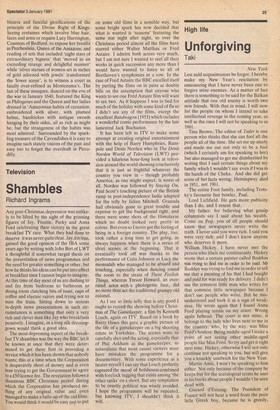Television
Shambles
Richard lngrams
Any post-Christmas depression was unlikely to be 'lifted by the sight of the grinning figures of Jay, Frostie, Parky and Anna Ford celebrating their victory in the great breakfast TV race. What they had done to deserve it was never quite clear. Jay, it is true, gained the good opinion of the IBA some years ago by writing with John Birt of LVVT a thoughtful if somewhat turgid thesis on the presentation of news programmes and the need for greater something or other, but how he thinks his ideas can be put into effect at breakfast time I cannot begin to imagine. At this time of day most of us are dashing to and fro from bedroom to bathroom to dining room clutching bits of toast, cups of coffee and electric razors and trying not to miss the train. Sitting down to serious in-depth news presentations in such circumstances is something that only a very rich and clever man like Jay who breakfasts pensively, I imagine, in a long silk dressinggown would think a good idea.
The most depressing aspect of the breakfast TV shambles was the way the BBC let it be known at once that they were determined to get there first in providing a service which it has been shown that nobody wants; this at a time when the Corporation is desperately short of money and is even now trying to get the Government to agree to a £50 licence fee. The revelation follows a disastrous BBC Christmas period during Which the Corporation has produced nothing of any original value and even managed to make a balls-up of the old films. You would think it would be easy just to put on some old films in a sensible way, but some bright spark has now decided that what is wanted is 'seasons' featuring the same star night after night, so over the Christmas period almost all the films have starred either Walter Matthau or Fred Astaire. I admire both actors very much, but I am not sure I wanted to seel all their works in quick succession any more than I would have wanted to listen to all of Beethoven's symphonies in a row. In the case of Fred Astaire the BBC excelled itself by putting the films on in pairs as double bills on the assumption that anyone who wants to see one Fred Astaire film will want to see two. As it happens I was in bed for much of the holiday with some kind of flu so I didn't see any of the films, except the excellent Bandwagon (1953) which includes a wonderful comic performance by the late lamented Jack Buchanan.
It has been left to ITV to make some attempt at creating original entertainment with the help of Barry Humphries, Rumpole and Denis Norden who in The Denis Norden World of Television (LWT) provided a hilarious hour-long look at television around the world showing conclusively that it is just as frightful whatever the country you view in — though probably America, as one might expect, is worst of all. Norden was followed by Staying On, Paul Scott's touching picture of the British rump in post-independence India adapted for the telly by Julian Mitchell. Granada had obviously gone to great trouble and expense to get the background right, and there were some shots of the Himalayas which no doubt looked very pretty in colour. But even so I never got the feeling of being in a foreign country. The play, too, took rather a long time to get going, as always happens when there is a series of short scenes at the beginning. That it eventually took" off was thanks to the performance of Celia Johnson as Lucy the memsahib who managed to be absurd and touching, especially when dancing round the room to the strain of These Foolish Things, whereas Trevor Howard, an overrated actor with a photogenic face, did no more than act the traditional grumpy old colonel.
As I see so little telly that is any good I ought to record the showing before Christmas of The Gamekeeper, a film by Kenneth Loach, again on ITV. Based on a book by Barry Hines this gave a graphic picture of the life of a gamekeeper on a big shooting estate in Yorkshire. The scenes were so carefully shot and the acting, especially that of Phil Askham as the gamekeeper, so naturalistic that most casual viewers must have mistaken the programme for a documentary. With some experience as a beater myself I can say that Loach perfectly captured the mood of bolshiness combined with forelock tugging that exists among 'the other ranks' on a shoot. But any temptation to be overtly political was wisely avoided. I hope the programme will be repeated, but knowing ITV, I shouldn't think it will.


































 Previous page
Previous page